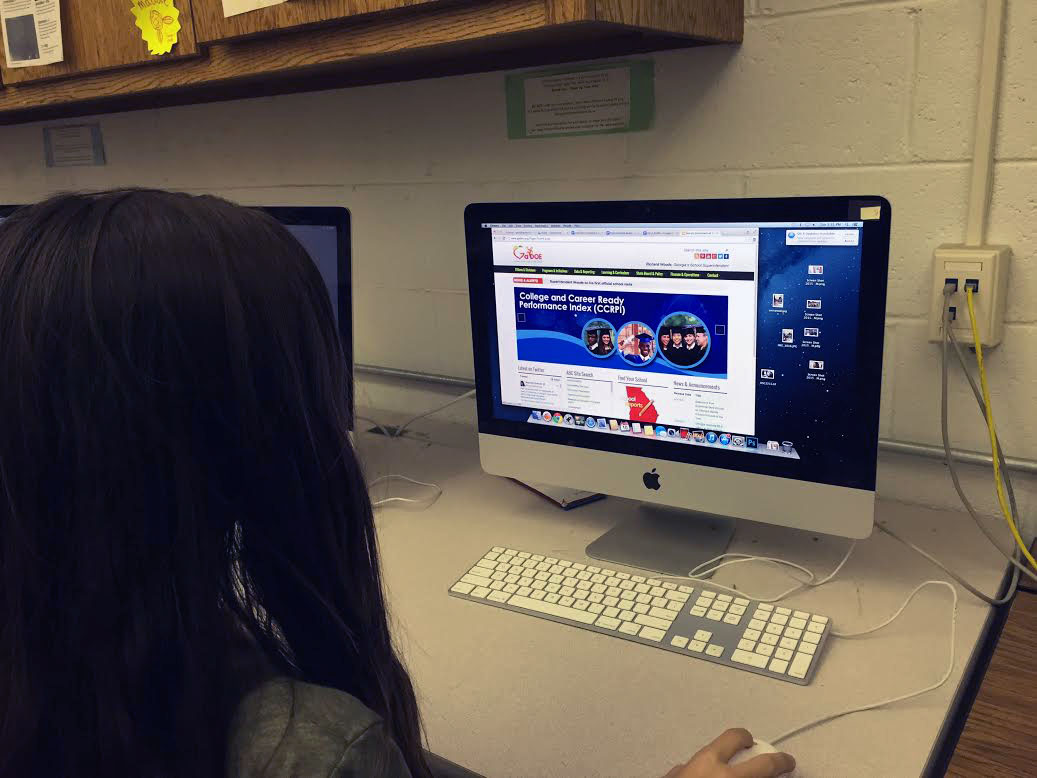A student takes the survey on the Georgia Department of Education website. The surveys are being implemented at Clarke Central High School for the first time and are used as a way to get anonymous feedback from students. “I (think that students can give valid responses to the survey), because they’ve had the teacher now for over half of the school year. I think we did it at a good time,” Assistant Principal Dr. Sheila Dunham said. Photo by Aneesa Conine-Nakano.
By ANEESA CONINE-NAKANO – Web Master
Recently implemented teacher evaluations have created a way for students to anonymously assess their teachers.
Clarke Central High School, for the first year, finished administering a round of student surveys to evaluate teachers and their learning style.
“The student surveys are a part of a new evaluation process and they are geared to get information in four areas and those are instructional strategies, differentiated instruction, positive learning environment and an academically challenging environment,” Assistant Principal Dr. Sheila Dunham said.
On the survey, the student is given a series of statements such as, “Do you think your teacher cares about your success?” and has the option of selecting “strongly agree,” “agree,” “disagree” and “strongly disagree”. Dunham believes that the results can help teachers improve their teaching methods.
“I think that the results can be beneficial to the teachers because they can reflect on the data and see what percentage of students think this and what percentage of students think that,” Dunham said.
This is the first year that Clarke County School District has administered these surveys, although it has been trialed in the state. The teacher will be able to see their overall results but will not see individual or select class period’s responses.
“It’s information for the teacher to reflect on, but the teacher’s evaluator also has access to the data. And so it’s information for the evaluator as well to help lead discussions with a teacher and it’s just more information,” Dunham said.
However, some students, according to Dunham, have not taken the survey seriously.
“I know that one teacher told me that a student told her that she didn’t like her and that she was going to give her bad responses on every question, and so the teacher said that, ‘It’s not a thing about whether you like me or not, it’s about my teaching,’” Dunham said.
English department teacher Zachary Thrower also heard from students that their responses were not influenced by how they felt.
“Based on conversations I have heard from students, some kids weren’t taking it seriously at all and just went down the survey and put the same answer without knowing what the question was asking,” Thrower said.
Sophomore Destinee Escoe agrees Dunham and Thrower with the sentiment that students do not give valid answers.
“I think the teachers know that students will be biased. During the survey people were like, ‘We are just going to put agree, agree, agree for the entire thing.’ No one took them seriously,” Escoe said.
Escoe also says that there are already enough measures in place to evaluate teachers.
“(The surveys) are pointless. I don’t think we should be doing them because why? There are already people coming to classroom and evaluating teachers. That should be enough. They are just taking time out of class,” Escoe said.
Dunham, however, thinks that the survey will be effective if students can answer seriously.
“I would hope that the vast majority of the students took it seriously and were trying to give honest feedback because if they’re not- the data’s only as good as the answers we’re giving,” Dunham said.
Despite the alleged flaws in the surveys, the surveys are not necessarily going to be discontinued next year.
“It’s up for discussion now,” Dunham said. “The evaluation instrument as a whole has been under a lot of discussion so we don’t really know for sure, but there’s been a lot of talk about various components of it. This is a very small portion of the entire picture.”
More from Aneesa Conine-Nakano
